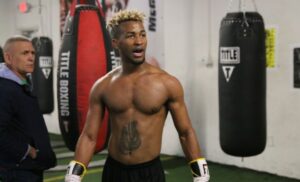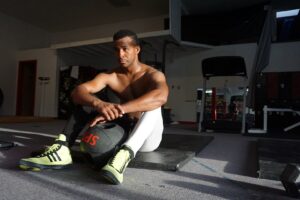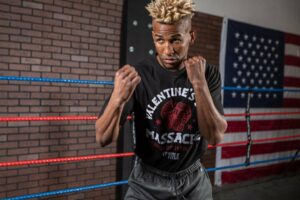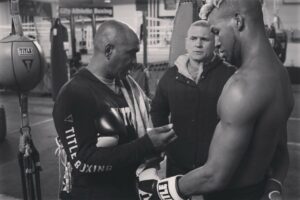On speaking to friends who had visited Cuba in recent years, they told me, ‘you wouldn’t even know Arroyo Naranjo existed’. Many homes are left without running water, whilst schools of children play Spanish stick-ball in the streets, content.
On the outskirts of Havana, boxing was prevalent in the little municipality, as it was throughout the exotic North American island. Its most successful export, two-weight World champion Rances Barthelemy (26-1, 13KOs), described his upbringing in Cuba, exclusively for Boxing Social.

“The training regime [for boxers] in Cuba focuses a lot on conditioning, agility and boxing fundamentals or technique. Since a young age, fighters have it ingrained in them that the name of the game is to hit and not get hit.
“We go through a series of drills for reflexes and footwork, shadow boxing, shadow boxing in pairs and sparring. In Cuba, fighters are taught to eat, breathe and sleep boxing.” He continued, “From a young age, it’s go to school and spend the rest of your time at the gym training. As you get older you get placed in boxing academies that work on the development of fighters 24/7.”

Since the prohibition of professional boxing in Cuba, their amateur schooling has been a thing of beauty. The most successful nation across Olympic and World Amateur Championships, conversely it had led to their finest fighters fleeing the country, most times literally under the cover of darkness.
Guillermo Rigondeaux, two-time Olympic gold medalist, was famously smuggled under a blanket, concealed at the back of a boat. When I’d last caught up with Rances, he’d told me of treading dangerous water and facing starvation whilst making his escape. There was often far more than boxing at stake.
After poor, unfair treatment from the Cuban amateur system, Rances’ elder brother Yan defected. The two younger siblings, Rances and fellow professional fighter, Leduan, decided to follow, risking everything for loyalty.
“One day, Leduan and I decided to make the two-day journey toward freedom, one that involved running on roofs, swimming with crocodiles, roaming through rocky terrain, hiding in the crags, and swimming hundreds of feet in the cold, turbulent ocean. Through it all, the toughest part was not being able to say good-bye to family and loved ones.”

“This decision has not only changed my life tremendously, but the entire Barthelemy family. I was able to rise up from severe poverty and make a living, doing what I love. I am able to provide for my family— my children, my mother, my father, my siblings.”
Barthelemy confessed, “Despite the difficulties and obstacles along the way, I would never trade my experiences for anything in the World. The only regret is not being able to return to Cuba sooner to see my parents and siblings or not being able to bring them to America with me.”
As he prepares to return to the ring on December 22nd, the middle Barthelemy child was rebounding from his first professional defeat. ‘Real Kid Blast’ had attempted to capture his third World title when facing Belarusian Kiryl Relikh, falling short when considered the favourite by many.
It would have seen him become Cuba’s only ever three-weight World champion, however issues throughout his preparation had thrown him. Now trained by former World champion Joel Casamayor, he bemoaned the lack of head coach during that disappointing camp, often left to his own devices as predecessor Ismael Salas trained David Haye, Joe Joyce and Jorge Linares in the United Kingdom.

“There were a lot of factors that contributed to that bad night. For one, I didn’t have a full training camp with my head trainer. Due to other obligations, my trainer came to the fight just a day before I was due in the ring and we only trained together for a couple of weeks, [this was] a few months prior. I believe that had a huge impact on my performance and strategy.
“My power and strength, I felt was lacking as well and I [had originally] thought my strength and conditioning got me in tremendous shape. I was missing the power and pop in my punches.”
Finally, he threw Relikh’s own conditioning into question, saying, “I was skeptical with the lack of drug testing in the weeks leading up to the fight and post-fight. Not a SINGLE urine sample was collected [for a World title fight], nothing taken away from Relikh, but he was not the same guy that night versus the previous fight.”
After suffering his first loss in nine years, Barthelemy had to regroup. Signed to Al Haymon’s Premier Boxing Champions, it was clear that he would be afforded chances at redemption.

A bout with WBC champion Jose Ramirez could be his earliest opportunity, with the IBF and WBA titles currently tied up. Although his conqueror Relikh is restricted with his entry into the World Boxing Super Series, Rances faces off with Robert Frankl this Saturday, on the road to that elusive third World title. However, surprisingly, he revealed that history may be forced to wait.
The Cuban maestro said, “The main aim for this fight is to keep myself active and get me on the trail back to lightweight. I want to see how my body absorbs the cutting of weight back down to 135lbs. Hopefully, we can get back towards title shots at lightweight and become World champion again in that division!
“There are a lot of great fights there for me to make. After that, I will return to 140lbs with the aim of becoming a three-division World champion.
“Next year, I plan on becoming a World champion again and ascending to the top of the sport. I plan on hopefully having a big unification fight, against a big-name opponent like [Vasyl] Lomachenko.”

Whether those big paydays were waiting for Barthelemy, remains to be seen. Sadly, so often, the elite Cuban fighters are frozen out of boxing’s biggest nights – either too good of too safe. Their elusive, flashy defensive ability didn’t always make for the best television.
Rances is now thirty-two-years-old, hunting for opportunities in some of the toughest and most convoluted divisions in the sport. Those same crocodiles that carefully kept their eye on him as he fled Cuba, now watch him approaching boxing’s murky waters to reclaim his treasure.
‘Real Kid Blast’ is gifted enough to fulfil his ambition, with countrymen Rigondeaux and now-coach Casamayor performing well into their thirties. Saturday is the first step on a dogged path to the top, but it wasn’t the first time he’d had to start over.

“It is difficult, in terms of not only adapting to the professional style but also adapting to life in the USA. I remember my first job at a hotel in America. I got a paycheck of $1000 and thought to myself, ‘This a lot of money, why do I need to box again?’
“What we are used to seeing in Cuba as far as money and material things is nothing compared to what we get exposed to here in America. That causes a lot of distraction, complacency and a lack of discipline for a fighter. On top of that you’re not surrounded by your family and loved ones… It’s easy for others to come around and try to give you the wrong advice which can ruin your career.”
Article by: Craig Scott
Follow Craig on Twitter at: @craigscott209